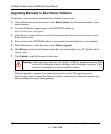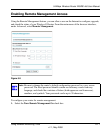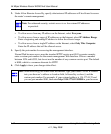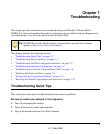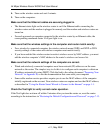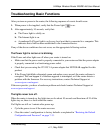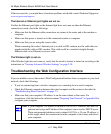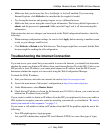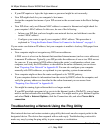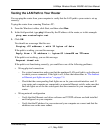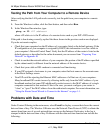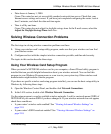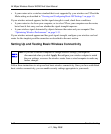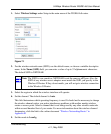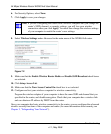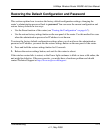
54 Mbps Wireless Router WGR614v8 User Manual
7-6 Troubleshooting
v1.1, May 2008
• If your ISP requires a login, the login name or password might be set incorrectly.
• Your ISP might check for your computer’s host name.
Assign the computer host name of your ISP account as the account name in the Basic Settings
screen.
• Your ISP allows only one Ethernet MAC address to connect to Internet and might check for
your computer’s MAC address. In this case, do one of the following:
– Inform your ISP that you have bought a new network device, and ask them to use the
router’s MAC address.
– Configure your router to spoof your computer’s MAC address. This procedure is
explained in “Using the Router Smart Wizard to Connect to the Internet” on page 1-1.
If your router can obtain an IP address, but your computer is unable to load any Web pages from
the Internet:
• Your computer might not recognize any DNS server addresses.
A DNS server is a host on the Internet that translates Internet names (such as www addresses)
to numeric IP addresses. Typically, your ISP provides the addresses of one or two DNS servers
for your use. If you entered a DNS address during the router’s configuration, reboot your
computer, and verify the DNS address as described in the online document you can access
from “Preparing Your Network” in Appendix B. You can also configure your computer
manually with DNS addresses, as explained in your operating system documentation.
• Your computer might not have the router configured as its TCP/IP gateway.
If your computer obtains its information from the router by DHCP, reboot the computer, and
verify the gateway address as described in the online document you can access from
“Preparing Your Network” in Appendix B.
• You might be running login software that is no longer needed.
If your ISP provided a program to log you in to the Internet (such as WinPoET), you no longer
need to run that software after installing your router. You might need to go to Internet Explorer
and select Tools > Internet Options, click the Connections tab, and select Never dial a
connection.
Troubleshooting a Network Using the Ping Utility
Most network devices and routers contain a ping utility that sends an echo request packet to the
designated device. The device then responds with an echo reply. Troubleshooting a network is
made very easy by using the ping utility in your computer or workstation.



